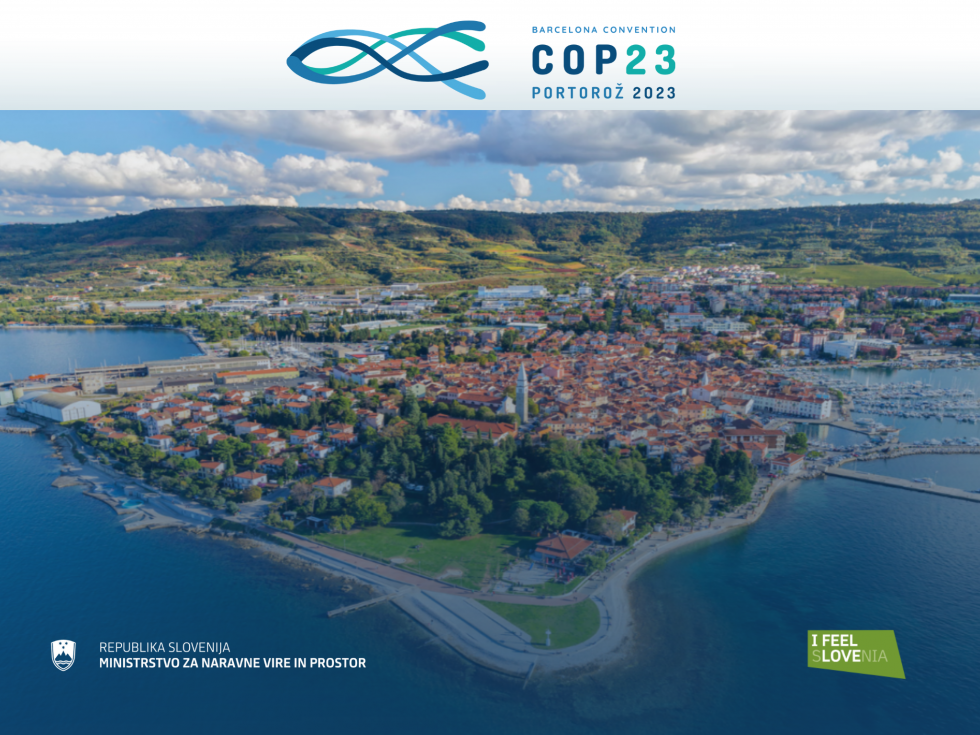COP 23: Young people will be key agents of change for a healthy Mediterranean
This is a regional meeting, aligned in terms of programme with the Convention on Climate Change (COP 28), which will take place in Dubai at the same time. At both meetings, countries will discuss environmental measures to combat climate change, with a strong focus on youth participation. But while the Dubai meeting is taking place at a global level and addressing broader environmental issues, the Portorož meeting is more specifically focused on local or regional issues "at home" in the Mediterranean.
The week on the coast of Slovenia, when the 23rd Meeting of the Member Parties to the Barcelona Convention, COP 23 – Conference for the Mediterranean, will take place under the auspices of the United Nations and co-organised by Slovenia, will be rich in content. In addition to the regular meeting of the Parties to review the implementation of the Convention and its Protocols and to set the agenda and priorities for the next biennium, the programme also includes a Ministerial Meeting, which is expected to adopt the Portorož Ministerial Declaration, and ten side events on topical issues such as climate change and marine and coastal pollution.
More details can be found on the official website of the Slovenian Presidency, while this at this occasion we are focusing more on the content of the side events.
Side events
For each day of the conference, side events have been organised by various Mediterranean professional, governmental and non-governmental organisations. These events provide a forum for a broader expert debate on topical issues ranging from combating plastic pollution in the Mediterranean, the Mediterranean's resilience to climate change and efforts to preserve biodiversity, to finding sustainable solutions for a healthy and secure future for the Mediterranean. The special focus will be on educating and empowering young people to adopt programmes to reduce shore-based impacts on coastal and marine ecosystems and measures to adapt to climate change.
Slovenia is co-organising a side event on the topic of engaging future generations, entitled "Education and Youth: for a Sustainable Future in the Mediterranean", which takes place on the last day of the meeting, Friday 8 December 2023. The discussion will bring together, among others, representatives of various UN organisations, as well as representatives of education ministries from several Mediterranean countries, including Slovenia. The event aims to share good practices and develop common guidelines for transforming school systems in the Mediterranean countries so that they provide an effective tool in combating environmental pollution and adapting to climate change in the face of increasingly frequent extreme climatic events.
Another side event to highlight is that on Wednesday 6 December 2023, entitled "Modern Tools to Promote a Sustainable Blue Economy", in which Slovenia is an active participant. The discussion will focus on the consequences of poor and disconnected management of water, coastal and marine resources, resulting in a rapid decline in the security of water, food, biodiversity and climate. There are major gaps in this area within national administrations and in transboundary cooperation, as well as at the level of international institutions. The Maritime Spatial Plan of Slovenia, which Slovenia was the first country in the European Union to adopt, will be presented as a concrete example of good practice and a starting point for discussion. In fact, strengthening the importance of blue and green corridors in spatial planning and management for the conservation of coastal and marine biodiversity in the face of climate change is one of the main tasks of the Slovenian Presidency. The blue and green corridors, which symbolise the sea, rivers and forests, are also depicted in the COP 23 logo.
Representatives of Slovenia will also participate in a side event entitled "Marine Protected Areas and Biodiversity", with the active participation of the Mediterranean Institute for Environmental Studies of the Science and Research Centre Koper and of Morigenos, a non-governmental organisation dedicated to the study and research of dolphins in the Slovenian sea. This part of the discussion will also focus on future generations, with the challenge of how to empower young people for marine conservation and of the role that NGOs can play in this.
Side events are also open to the general public and the media, subject to prior accreditation.


